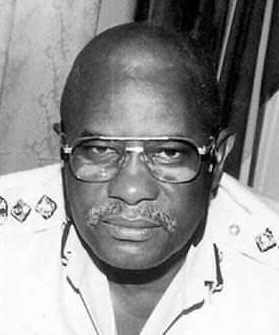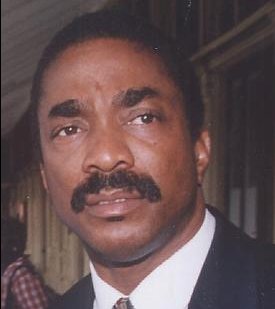

|
Matters
of high public interest
Commissioner of Police, Mr Winston Felix Because
of its startling and disturbing content, this recorded conversation
eventuated much public debate, concern and even outrage. The government’s response was in the form of a statement, the content of which is simply baffling to the rational mind. One can only hope that a response of greater cognition shall be soon forthcoming.
Vice
Chairman and Parliamentarian Mr
Basil Williams The PNCR response was more expansive and it came in the form of a press conference. Like the government, the PNCR refused to deal with the content of the conversation but rather concentrated their energies and emphasis on its source and manner of acquisition. They contended, inter alia, that the taping of the conversation and its broadcast was ‘illegal’ and that it constitutes an invasion of privacy, arguing with credulity, that the conversation was a private conversation, as if that makes a difference! The
‘illegality’ of which the PNCR spoke was neither explained nor
elaborated. One would have expected that the rule or principle of law that
was allegedly breached or the offence which was allegedly committed would
have been identified. Unfortunately, this was not done. It
was argued that the taping of the conversation and its broadcast
constitute an invasion of privacy. I respectfully submit that there is no
right to privacy known to the laws of Guyana or even the common law of
England from whence we received our laws. The following passage of great
relevance appears in the well known and respected text, `Gatley on Libel
and Slander’ 9th edition at page 514: “There
is no doubt that the English common law does not recognise a tort of
invasion of privacy and does not therefore grant any direct action for
such invasion”. The
identical position obtains in Guyana. In
the English case `Waynright and another –v- Home office’ (2004) 4
L.R.C. page 154, the House of Lords held inter alia, that there was no
common law tort of invasion of privacy. A similar position was arrived at
by the House of Lords in `Malone –v- Commissioner of Police’ (1979) 2
Aller page 620 and by the Court of Appeal (United Kingdom) in `Kaye –v-
Robertson’ (1991) FSR 62. The
issue of right to privacy arose in New Zealand, a common law jurisdiction
like Guyana, in the case of `Hosking et al –v- Runting et al 2004’ 2
LRC page 65, where a magazine wanted to publish the photographs of two
infant children taken in a public place without the parents’ permission.
The parents sued claiming that the taking of the photographs and/or their
publication without consent amounted to a breach of their children’s
right of privacy. The
High Court of New Zealand held that New Zealand law did not recognise a
tortious cause of action in privacy based on publication of photographs
taken in a public place. Based
on the aforesaid authorities, it is clear that the right to privacy is not
known to the common law and as stated above, not known to the laws of
Guyana. The
argument in respect of the breach of a right to privacy is therefore
woefully misconceived. It
is clear that the matters contained in the recorded conversation are
matters of high public interest; they raise issues which touch and concern
the internal security of Guyana and they bring into question the conduct
of Guyana’s premiere law enforcement officer. It
is respectfully submitted that this is information of which the public has
a constitutional right to be apprised and which the media has a
concomitant right and duty to disseminate. In `Hosking
–v- Runting’, (supra) the court made the following seminal
observations: “the
importance of freedom of expression and the role of the media in a
democratic society needs no emphasis. There is a strong public interest
not only in the right to impart information but also in the corresponding
right of the public to receive it. Any limitations imposed upon freedom of
expression, whether by statue or by development of the common law, should
reflect established principles. If there was any right to privacy of the
kind alleged, the court would have found it to be clearly overwhelmed by
the right of freedom of expression…..” I
respectfully submit that even if the law afforded a right to privacy in
Guyana, having regard to the nature of the matters contained in the
recorded conversation and the status and standing of the persons allegedly
engaged in that conversation, that right to privacy would have had to bend
and bow to the constitutional right to free expression. So
that the lay public is not misled on vital matters of law. Now,
for the first time, the Government of Guyana has taken a strong stance
against criminals, not the foot soldiers we know are hiding in places such
as Buxton, but at the purported heads of these criminal organisations, and
has publicly embarrassed them. (I do believe given the DPL vehicles
outside the Ministry of Home Affairs that this was a well-planned exercise
to crack down on criminals). But
Mr McCoy and his viewers spent the entire show attempting to ridicule the
Commissioner of Police. I
don’t know where McCoy got the impression that the tape is more
important than the drugs and arms bust and social embarrassment the Police
and Army have handed out to these people. I
would like to congratulate the Police and the Army, more so on finally
heeding the calls of “Kwame and NTN” to get involved in solving crimes
in this country. I
was really surprised that the viewers did not support the Commissioner
since it is they who are crying out the greatest about the dysfunctional
police service and the lack of commitment to solving crimes in Guyana. The
Police have finally attacked the head and they cry once more. Getting the
criminals out of Buxton will only put back more if the heads of these
groups are still there. I do
admit, however, that the Police Commissioner should apologise for his
comments on some persons as these are indeed a blow to his effectiveness
in dealing with these people in the future. He
should also apologise for his comments about the Portuguese, even though I
believe he was referring to the two persons named and not the entire
Portuguese population of Guyana. Let’s
support the Commissioner; he may be very slow in helping but at least he
has shown that he has some guts to deal with the big bosses.
|

